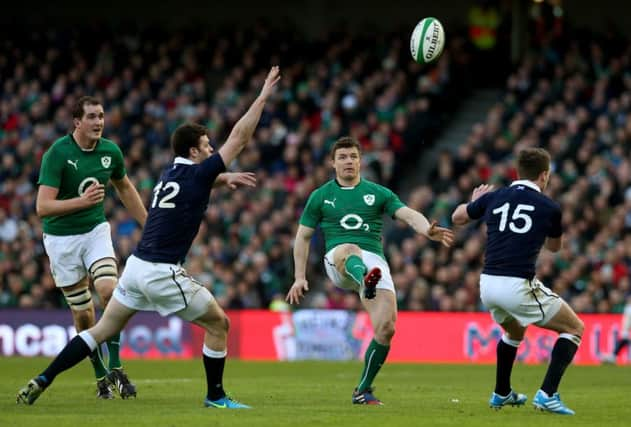Allan Massie: Scotland too committed to recycling


This clearly makes good sense, and a great deal of modern rugby is played to this formula.
Sometimes it works, a classic example being the build-up to the last-minute try with which the All Blacks snatched victory from the gaping jaws of defeat against Ireland in November. But quite often it doesn’t.
Advertisement
Hide AdAdvertisement
Hide AdIn the first half in Dublin Scotland diligently went through the phases, recycling the ball quite efficiently, and got precisely nowhere. Moreover, fewer than half the tries in the first two rounds of the Six Nations have come as a result of patiently re-cycling the ball. More have come from latching on to opposition mistakes, or from moments of individual brilliance such as those from Wesley Fofana which gave France two tries against Italy, or simply from a fortunate bounce of the ball, alertly snaffled by a player following up.
Alertness of this sort has been missing from the Scotland game, perhaps because it’s not something you can plan for. It may be unfair to say that they have given the impression of playing by numbers – “this is what I’m supposed to do next”; nevertheless that’s what it has looked like. There was a moment in the first half on Saturday when Owen Farrell dropped a pass from his scrum-half in the English 22. Nobody was expecting this; it wasn‘t in the programme. So nobody was on hand to take advantage of it. Farrell had all the time in the world to gather both his wits and the ball, and kick for touch.
When a team plays as dismally and loses as badly as Scotland did on Saturday, it’s natural to call for wholesale changes. But the coach or selector has a dilemma. The team picked for the game was the best available in his opinion. It’s unlikely that he will think that players not selected have suddenly got better than those he chose. So does he stick to his guns, assuming that they won’t play as badly again? This is a reasonable option. Shame can be a sharp spur.
Or does he say, morale requires changes, failure is punished, give others a chance? Certainly this is how French coaches responded to defeat. But then, you may say, they have more choice available. Yet our set scrum and line-out have failed so badly it would seem illogical to stick with the same front five. Admittedly, though the new preliminaries to the scrum have brought some improvement, this part of the game remains a bit of a lottery, over-dependent on the referee’s interpretation of what is going wrong, and who is responsible, when a scrum goes to ground.
On Saturday Moray Low incurred the referee’s wrath, but a different official might have judged it was his opposite number, Joe Marler, who was transgressing. Still , one can’t help thinking the front row should change. Neither Ryan Grant nor Ross Ford has been playing as well they can. Grant was outstanding last season, but one wonders if he is finding it difficult to adapt to the new scrum set-up.
As for the line-out it has been so bad that it is surely inconceivable there won’t be changes. Is Richie Gray really so badly out of form he was rightly dropped altogether from the squad? Or is there some other reason for his demotion? For many the logical selection would be to pick the Gray brothers against Italy. It might not only lead to an improved line-out, but would also give us two forwards good at off-loading the ball, thus enabling a faster, more open game.
Since Johnson has decreed Kelly Brown is being considered only as a 7, it would be illogical to bring him back, as it would mean dropping Chris Fusaro after a debut match in which he did better than most. Some of us would like of course to see Brown at 6, but if this is out of the question, then Johnnie Beattie there would add a bit of devil to forward play.
Neither half-backs had a good game against England, but, if you had switched the halves, I would think Danny Care and Owen Farrell might have been as uncomfortable as Greig Laidlaw and Duncan Weir were, while they in turn might have blossomed behind the England pack. As for the three-quarters, they saw so little ball it would be perverse to change there.
Advertisement
Hide AdAdvertisement
Hide AdOne other thought which may, for the moment anyway, lighten the gloom. It is just possible that, despite England’s defeat in Paris, we have already played the two best teams in the tournament. Certainly Ireland made Wales look every bit as bad as us the week before. And, finally, a note to all rugby players. For all the talk about the importance of holding the tackled player up by means of the two-man choke tackle, Ireland showed the best way of stopping a big powerful runner is what it has always been: the classic low tackle.